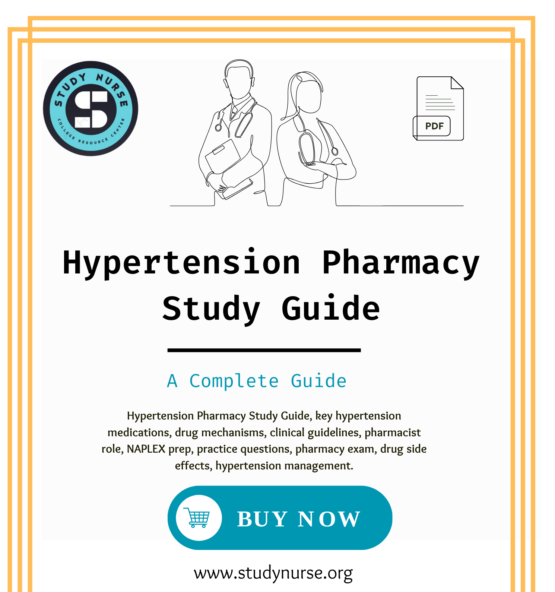


The Hypertension Pharmacy Study Guide is an essential resource for pharmacy students and professionals preparing for the NAPLEX (North American Pharmacist Licensure Examination). Whether you’re in pharmacy school or studying for certification exams, this comprehensive guide provides everything you need to master the complexities of hypertension management. From in-depth drug information to clinical guidelines, this study aid is designed to enhance your knowledge of hypertension treatment, its pharmacology, and the role of pharmacists in managing high blood pressure.
Availability:In Stock
Complete Medication Overview: Learn about the top hypertension medications, including ACE inhibitors, ARBs, diuretics, beta-blockers, calcium channel blockers, and more. Understand their mechanisms of action, dosing, side effects, and contraindications.
Clinical Practice & Guidelines: Stay up to date with the latest hypertension management protocols, including the current recommendations from leading organizations like the American College of Cardiology (ACC) and the American Heart Association (AHA).
Role of the Pharmacist: Gain insight into how pharmacists contribute to hypertension care through patient education, monitoring treatment efficacy, adjusting therapy, and counseling on lifestyle modifications.
NAPLEX Focus: Targeted content for NAPLEX preparation with practice questions and clinical scenarios, ensuring you’re ready to tackle hypertension-related questions on the exam.
Clear and Concise Study Structure: Whether you’re preparing for a final exam, certification, or the NAPLEX, this guide simplifies complex concepts and helps you focus on key topics for effective studying.
What are the top 5 hypertension medications?
The top five medications commonly used to manage hypertension include ACE inhibitors, ARBs (Angiotensin II Receptor Blockers), calcium channel blockers, diuretics, and beta-blockers. Each class has a distinct mechanism of action and is chosen based on patient characteristics and coexisting conditions.
Pharmacists play a crucial role in hypertension management by providing medication counseling, adjusting dosages, monitoring patient adherence, and educating patients on lifestyle modifications. They work closely with physicians to optimize treatment and ensure that patients are on the most effective regimen.
The American College of Cardiology (ACC) and the American Heart Association (AHA) are the leading organizations that provide comprehensive guidelines for the management of hypertension. These guidelines emphasize the importance of early detection, lifestyle modifications, and the appropriate use of antihypertensive medications.
A high blood pressure reading is typically defined as a systolic pressure (top number) of 130 mm Hg or higher, or a diastolic pressure (bottom number) of 80 mm Hg or higher. Hypertension is categorized as stage 1 (130-139/80-89 mm Hg) or stage 2 (140+/90+ mm Hg) depending on the severity.
This Hypertension Pharmacy Study Guide is an invaluable tool that will prepare you for a successful career in pharmacy and patient care. Keep it handy for exam prep or as a reference for real-world practice—ensuring you’re always prepared to help patients manage their blood pressure effectively.
Reviews
There are no reviews yet.